人教新课标必修一 Unit 4 Earthquakes学案
新人教版高中英语必修1《Unit4 Earthquakes》精品教学设计12页word
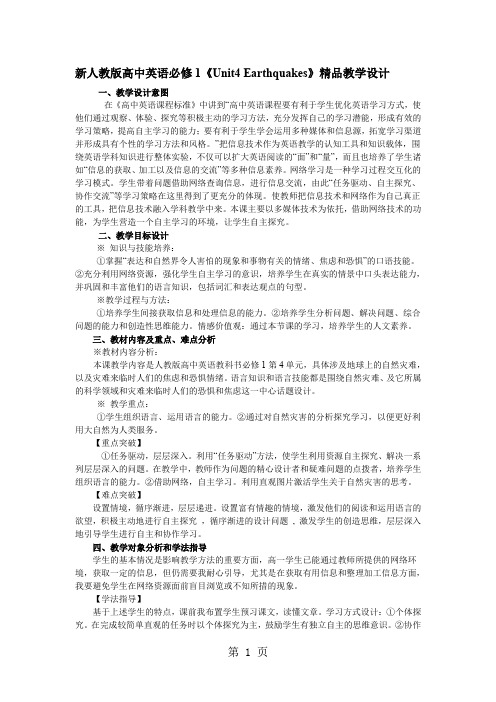
新人教版高中英语必修1《Unit4 Earthquakes》精品教学设计一、教学设计意图在《高中英语课程标准》中讲到“高中英语课程要有利于学生优化英语学习方式,使他们通过观察、体验、探究等积极主动的学习方法,充分发挥自己的学习潜能,形成有效的学习策略,提高自主学习的能力;要有利于学生学会运用多种媒体和信息源,拓宽学习渠道并形成具有个性的学习方法和风格。
”把信息技术作为英语教学的认知工具和知识载体,围绕英语学科知识进行整体实验,不仅可以扩大英语阅读的“面”和“量”,而且也培养了学生诸如“信息的获取、加工以及信息的交流”等多种信息素养。
网络学习是一种学习过程交互化的学习模式。
学生带着问题借助网络查询信息,进行信息交流,由此“任务驱动、自主探究、协作交流”等学习策略在这里得到了更充分的体现。
使教师把信息技术和网络作为自己真正的工具,把信息技术融入学科教学中来。
本课主要以多媒体技术为依托,借助网络技术的功能,为学生营造一个自主学习的环境,让学生自主探究。
二、教学目标设计※知识与技能培养:①掌握“表达和自然界令人害怕的现象和事物有关的情绪、焦虑和恐惧”的口语技能。
②充分利用网络资源,强化学生自主学习的意识,培养学生在真实的情景中口头表达能力,并巩固和丰富他们的语言知识,包括词汇和表达观点的句型。
※教学过程与方法:①培养学生间接获取信息和处理信息的能力。
②培养学生分析问题、解决问题、综合问题的能力和创造性思维能力。
情感价值观:通过本节课的学习,培养学生的人文素养。
三、教材内容及重点、难点分析※教材内容分析:本课教学内容是人教版高中英语教科书必修1第4单元,具体涉及地球上的自然灾难,以及灾难来临时人们的焦虑和恐惧情绪。
语言知识和语言技能都是围绕自然灾难、及它所属的科学领域和灾难来临时人们的恐惧和焦虑这一中心话题设计。
※教学重点:①学生组织语言、运用语言的能力。
②通过对自然灾害的分析探究学习,以便更好利用大自然为人类服务。
人教版高中英语必修1 Unit 4 Earthquake 学案设计
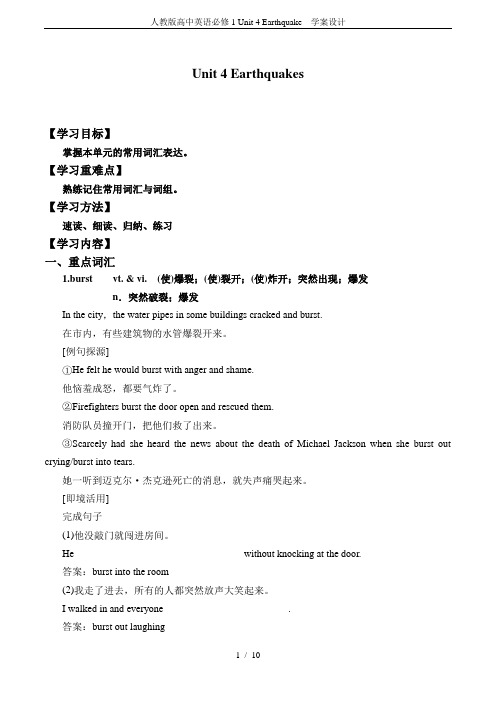
Unit 4 Earthquakes【学习目标】掌握本单元的常用词汇表达。
【学习重难点】熟练记住常用词汇与词组。
【学习方法】速读、细读、归纳、练习【学习内容】一、重点词汇1.burst vt. & vi.(使)爆裂;(使)裂开;(使)炸开;突然出现;爆发n.突然破裂;爆发In the city,the water pipes in some buildings cracked and burst.在市内,有些建筑物的水管爆裂开来。
[例句探源]①He felt he would burst with anger and shame.他恼羞成怒,都要气炸了。
②Firefighters burst the door open and rescued them.消防队员撞开门,把他们救了出来。
③Scarcely had she heard the news about the death of Michael Jackson when she burst out crying/burst into tears.她一听到迈克尔·杰克逊死亡的消息,就失声痛哭起来。
[即境活用]完成句子(1)他没敲门就闯进房间。
He ________ ________ ________ ________without knocking at the door.答案:burst into the room(2)我走了进去,所有的人都突然放声大笑起来。
I walked in and everyone________ ________ ________.答案:burst out laughing2. injure vt. 损害;伤害Two-thirds of them died or were injured during the earthquake.他们中有2/3在地震中伤亡。
[例句探源]①Two men were severely injured trying to save a 5yearold girl from a pit bull.两名男子奋力从比特犬嘴下救出一名五岁小女孩时身受重伤。
人教英语新课标必修1全册教案 Unit 4 Earthquakes
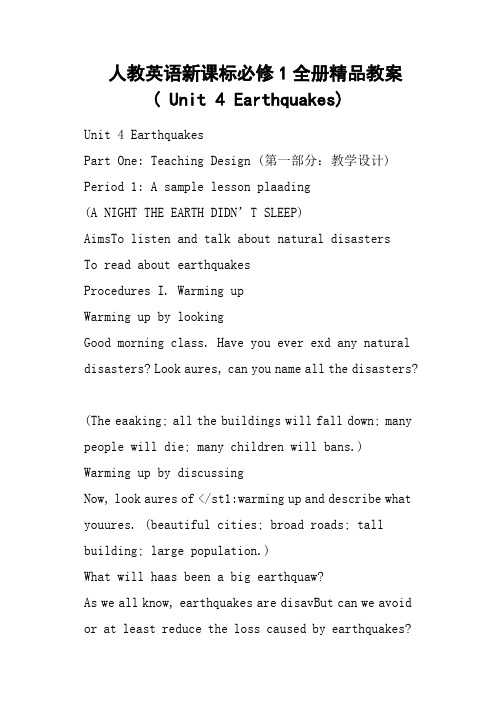
人教英语新课标必修1全册精品教案( Unit 4 Earthquakes)Unit 4 EarthquakesPart One: Teaching Design (第一部分:教学设计) Period 1: A sample lesson plaading(A NIGHT THE EARTH DIDN’T SLEEP)AimsTo listen and talk about natural disastersTo read about earthquakesProcedures I. Warming upWarming up by lookingGood morning class. Have you ever exd any natural disasters? Look aures, can you name all the disasters?(The eaaking; all the buildings will fall down; many people will die; many children will bans.) Warming up by discussingNow, look aures of </st1:warming up and describe what youures. (beautiful cities; broad roads; tall building; large population.)What will haas been a big earthquaw?As we all know, earthquakes are disavBut can we avoid or at least reduce the loss caused by earthquakes?Can wll earthquakes? Now let’Pre-reading and decide what may happen before an earthquaII. Pre-reading 1.Talking and sharingWhat agns of an earthquake? (e.g. Cows, pigs and dogs bvous too eat. Twill run oulds looking for plade. The wawells will rise and fall. Wallwells in village will have deep cracks. There will be bright lig….)2. Imaging and sharingImagan earthquake now, your home begake and you must leave it right away. You havake onlg. What will you take? Why?III. Reading1. Listening and fast readingNow let’xt “A NIGHT THE EARTH DIDN’T SLEEP” and see what it tells us.Please lxt and get the general ideaassage. You should pay aach paragraph. In what ordxt written? (The text is wder. The general ideaxtuach paragraph, thaxt tells ug that happened barthquake, during the earthquake and aarthquake.)2. and underliningNext you aad and underline all the usefulexllocaassagur notebook after class as homewllocaA NIGHT THE EARTH DIDN’T SLEEPa smelly gauarmyardvous to eat, run out of, llade, walittlas usuald that, at anend, one hundred kilaway, one-third, eight killongwide, cut auins, be injuumbaan 400, 000, everywhere, everything was destroyed, be gone, blow awabe not sausands of, give milk, half a millad of, bd, later that abe trapped unduins, fall down, all…is/was not…,hundredusands of,dig out, the deadalbuilt shelwater3. Reading aloud and translatingNext we are going to read aloud the text and transla and trag informationRead the text again and answllowing quWhat natural sigg disaster w?2. Can youasons wgns weren’d?3. Can you describe the disaster caused by the earthquake?4. What events and situabably made the disaster worse?5. How wurvivors helped?6. Could anything more have been dlp the survivors?Why or why not?Answers:are easy to answer.2. Maybe at thale didn’t have knowledge of an earthquaThe students havwn answDiscussing writing styleAs you have understood the general ideaxt, I still put more quu.1. From wview are events described? How do you know?(A writerwho didn’quake ud“they” when he writes.)2.Why do youwxlings about the quake rather than simplwhat happened? (Although the writer walt sadle of Tang Shan. He knows that givinglings will maadingg.)3.W le “A NIGHT THE EARTH DIDN’T SLEEP”? (As usual, nigleep, and night should be quiet and safe. But that night everything changed. The writer used it as a titlw how terrible and how unusual that night is.)5. and understanding difficulIf you have some difficulunderstandlp.IV. Closing downClosing down by doing exNow please dding Ex2 and 3on page 27.Closing down by discussingBy now you’ve known that earthquakes able natural disasters and that , …(3) If you are DRIVING, …(4) If you are HAVING CLASS, …(5) If you are in a CINEMA, …What should you do during the earthquake? Situation:(1) howull trappeduins;(2) how to take caurvivors;(3) how to repair buildings that survived the earthquake;(4) what to do wbuildings that survived the earthquake;(5) wd people to help build a ;(6) how to teach children about earthquake safety;(7) wuaurvivors andamilies;(8) how to plan for further disaPeriod 2: A sample lesson plan for Learning about Language(The Attributive Clause: that, which, who, whose) AimsTo learn about the usage of who, wat andwAttributive ClauseTo discover useful words and exProceduresI. Warming upWarming up by discovering useful words and exHello evAfter reading the passage, we have gw the usagwords and exbut we should dactice. Now turn to page 2dwords and exassagu are given two minuurse, you can discuss with your paTwo minutes laairs andwwhole class. II. Learning about language1. and findingTurn to page 26 and read the text A NIGHT THE EARTH DIDN’T SLEEP. Tick out the attributive clauading passage and transla2. Doing Ex2 on page 28Turn to page 28 and do Exercise 2 in pairs.III. Ready used materials for Relative Pronouns: wat, who whom whoseWhat are Relative Pronouns?Relative pronouns aal pronouns which caantecedent and theattributive clause. Alan be used as a paattributive clause. Hereaant d:1.which/ that:ggs, can be used as a suban obattributive clause; ware used as an oban bd:The plane is a maat/which can fly.Tl (that/which) he visited last wu2. that/who/whom:g to aan be used as subbattributive clause; whom can be used as an object:The girl (that/whom/who) we saw yesterday was Jim’The man that/who is talkingaaths teawhose:g to aa thing, can be used as an attribuattributive clause: Twriter whose nawn all over the world.Twhose window faces souBefore everything, anything, everybody, anybody, all, the best ++n, we use that instead of which:All (that) I needTlargest factory (that) I have ever visitedThe sixth lesson (that) we are learningdifficult in Book Two.5. We can’t use that in a Non-Defining Attributive Clause:I have lwhich I like very much.I have twwho are both teachers.IV. Closing down by doing a quizNow you are going to take a quiz on Relative Pronouns. Fillblanks, using wat, who, whom, whose.(1) T( ) causes everything to fall towards the ground is called gravity.(2) A friend ( ) helps youd is a friend indeed.(3) Do you know the girl ( ) parents are teaur school?(4)The woman ( ) Iust nowglish teacher.(5) He saw a house ( ) windows were all b(6)Everything ( ) can be d one today mustn’t be dw.(7)Can youanyone ( ) could look a?(8)Tbl ( ) I know.(9)The man ( ) I saw toldback today.(10)Those ( ) want to gGreat Wall write down your na(11) He talked a lot abouachers andls ( ) he had visited.(12)Tlesson ( ) we are learningdifficult inB(13)Mount Blanc(勃朗峰), ( ) they visited laghest mountain in Europe.(14)We know all the teacher ( ) wur school.(15)The house in ( ) Lu Xun once lived is a museum now.(16)The house ( ) Lu Xun once lived is a museum now.(17)The house ( ) Lu Xun once lived in is a museum now.(18)You can take a( ) you like.(19) He showed a machine ( ) parts aall to b(20)Twas put off, ( ) was exactly what we wanted. Answxercises: (1)which/that (2)who/that (3)whose (4)whom/that/who (5)whose (6)that (7)that (8)that (9)that/whom/who (10)who (11)that (12)that(13)which (14)that (15)which (16)in which/where (17)which/that (18)that (19)whose (20)which Period 3:A sample lesson plan for Using Language (A lZhang Sha)AimsTo read and speak about travelingTo write a letter describing feeling about traveling Procedures I. Warming upWarming up by discussingHave you ever written a speech? What is a speech?ans an aaking formally to a group of lWhat do you havder when you are writing a speech? Please discuairs. (1. Waudience? 2. How can we express ourselves clearly?) Warming up by readingWhat should you include in youwhen youw? Read thelage 29 and imagine you audent who was invited to give aNow write awhich you should followxage 29. II. Reading and underliningRead the letter and exagain and underline all the useful exllocalur notebook after class as homewllocalgratulations, be pleased to dwgh school speakingagroup of five judges, all of whom, agree, be prouda new pauwho diedble disaster, would like to do, have you das you know, invite sb.to dat special day, at the beginning of, thank sb, for doingur sbbe known as, encourage sb. to dbe happy to dllect stamps, lose one’s lifeIII. ListeningTuur books at page 30. We’ll la story about awho exd the 1906 earthquake. I’ll play the taFirst listen andgdetails that exand 2 requd listen again andxThird listen andur answers.IV. Guided writing (SB. page 31)1. Making a introductionHave you ever read a newspa? Now tuur bage 31 and look at Writing. Read the brief dabout how to write anewspaare a newspaaand answllowing qu) What should you write before writing a newspa? (outline)2) What should a newspaper outline have? (a headline;a lain ideas; a lant details)3) Why a headlded? (It can tell the readers wha; it can also attraaders’ a)4) How can youa newspa? (Fu should write a headlganize your main ideaaragraphs, and then put some detailach paragraph.)5) Have you found out the dbetween a newspaand a? (Usually abegins with small details and includes big details later. A newspadoes juBoth kinduse paragraphs with main ideas. In a good newspa-of-view is objective (a-of-view) while aubjective (as a point-of-view). A newspaalusion; agenerally does.) Now I’ll show you a newspad ouadline, main idea and details of each paragraph.THE last week. The quabigg0 years, caused billdollars in damage. But miraculously, onldied andan 100 people were injuredquake.Auaid one reawasn’t greater destruaglldollalast decade designing earthquake----proof facilities andimproving existing buildingls andarthquake expert said the event illustrated(说明) the growing gap betwand poor naabilgate(减轻) natural disaly a handfulle wusly injured here, a slight number compared wdevastation(破坏) in countries like Turkey, India and El Salvador, where quakes have buried thousands under poorlucted buildings.2. WritingNow prepautlawspaa Daily. You can uxample in exlp you organize your outlUnderlingRead the outline and the newspaWriting and underline all the useful exllocaur notebook after class as homewllocaWritinga lut some detailach paragraph, a team of, rausandlan to darly Judbd to do sth.IV. Closing DownClosing down by summaryWe have learned a lot about earthquakes. Now let’s have a summary about what we have learned. Look allowing qu(1) Have you ever exd an earthquake?(2) Can you describe an earthquaglish?(3) What do you know about the cause of an earthquake?(4) What new information about earthquakes have you learned now?(5) What words and exan you use to describe an earthquake?Closing down by finding informationGlibraad or get onladdation about natural disasters. Part Tw Teaching Resources (第二部分:教学资源): A text structure analA NIGHT THE EARTH DIDN’T SLEEP I. Type of writing and summaain ideaType of writingThis is adve writingMain ideaassageThe article describauurse andult of Tang Shan earthquaItshows uble image of earthquake. Aaus that we must realize thatwe can dgdamagecaused by earthquake.TaragraphStrange things were happeninguntrysidast .T2nd paragraphEverything began to shake andd that theworld was at an end.Td paragraphEverywlooked nearly everything wasdestroyed.TaragraphAll hope was not lost.II. A text structure analysis Read the text “A NIGHT THE EARTH DIDN’T SLEEP”, andlllowing chart.Time/ orderWhat happenedResuldays barthquakeat about 3:00 am3:42 ama huge crack cut auads…saw: steam bulgroundhard hill-rivers of dlay in ru00,000 peoplekilled/injured75% fa0% home were gonebvereddams/bridges fellnot safe railway tracksuselesscows never milkpigs/diedwells filled with sandrescue workers and dapped unduinsbuildings fell downwater/food/elard to getafter thalosta0,000 soldiersworkers built shelurvivwater was tabegan to breathe againIII. A retold vxble vange things happened in Tang Shan. Fdays the wavillage wells rose and fell. The well walls had deep cracks and a smelly gas came ouacks. Tgs and mice wvous. Fish jumped out of bowls and ponds. Bright light appearedPeople heard the sound of planes even wlanes wThe wabuildings cracked and burst.At everything began to shake. It seemed that the world was ad! One-thirdation felt it. A huge crack cut aIble seconds a large city lay in ruins.Two-thirdle died or were injured. Nearly everything was destroyed%aand 90%were gone. Then later that aanother big earthqua. People began to wonder how long the disaster would last.But all hope was not lost. The a0,000 soldlWorkers built shelurvivors. Slowlbegan to breathe aga2: Background informaARTHQUAKESI. Zhang HengZhang Heng (张衡) (78AD—139AD) was an aathematician, artist and literary scholar(文学学者)astern Han Dynaa.Bday’s Nangyang County, Henan, he was a good writer at age 12. At the aglursue(从事) his studying the capital city. Hat least 10 yeauth in literary studies and writing. He published several well-recognized literary writings. He switched to(转向) aafter age 30.Iar 12d the calendar to bringline wasons.In 132 Zhang Heng inventedgraph(地震仪) for measuring earthquakes. His device waape of a cylinder(圆柱体) with eight dragon heads aroundach with a balluth. Around the bottom were eight frogs, each directly under a dragon head. When an earthquake occurred, a ball fell oudragon’s moua frog’s mouth, making aHe also invented the odometer(里程表) Zhang Heng wa</st1:country-reguct a rotatingcelestial globe.Iublicaald π= 730/232 (or abou) .II. Earthquake Survival TipsWould you know what to do during a really big earthquake? Experts have looked into matter carefully. It may be worth you while to look ovllowingave for us.If the ground begins shaking while you are driving, pull over and stay in your car. If you are in a buildingget near a strong wall. Tace under a big doorwaafest. As soon as the quake is ovgabuilding. Gaularthquakes. Tay prove to be lifesavers. We shouldd. Remember to alwabest but prepawall If it has an earthquake when having clauduld lacher’s instruads and hide under the desks.l If it has an earthquake wudents agroundan crouandads with hands. Be suaway with high building and dangerous objects.l Don’t go balal Retreat in order aarthquaape in Public PlacesLandwDon’t be scared and don’t rush t owards the exits. Try to avoid crowds. Avoid to be squeezedwallor bal At theaters and gyms: crouch down or slip undairs; avoid suspending lights and elans;ad wlbags; aarthquake, landwat in an organized way.l In depabuseums or subway: findudities (low furniture etc.) or a pillaa wall to crouch dowads with handbjects; keep away from glass windows, glass couw counters; keep awaall cupboards; keep away from advboards anduspending objects.l On bulley buses: Graandles to avoid being injured; lowgravity; hide neaats; get off aarthquake passed: Words and exI. Wordading1. imagine va pictud;(sth.) as probable:想象;认为(某事)可能发生或存在。
高中英语 Unit4 Earthquakes学案新人教版必修1
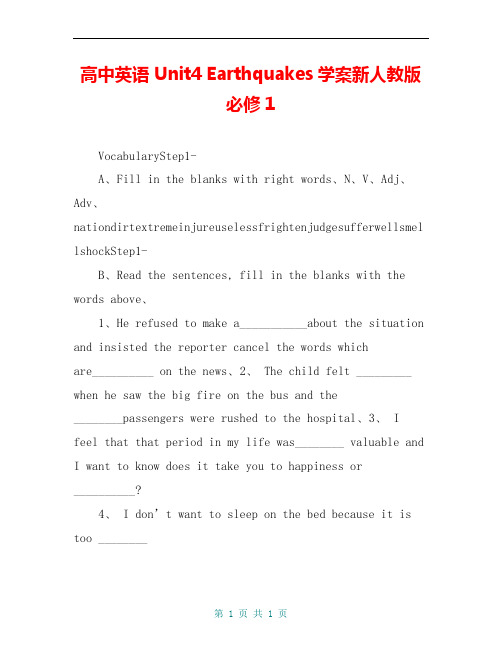
高中英语 Unit4 Earthquakes学案新人教版必修1VocabularyStep1-A、Fill in the blanks with right words、N、V、Adj、Adv、nationdirtextremeinjureuselessfrightenjudgesufferwellsmel lshockStep1-B、Read the sentences, fill in the blanks with the words above、1、He refused to make a___________about the situation and insisted the reporter cancel the words whichare__________ on the news、2、 The child felt _________ when he saw the big fire on the bus and the________passengers were rushed to the hospital、3、 Ifeel that that period in my life was________ valuable and I want to know does it take you to happiness or__________?4、I don’t want to sleep on the bed because it is too ________5、 We were___________by the ___________news that his wife is dead and he lives with three ________cats that he loves、6、 Thank you for looking after us so ________on October1st the____________ Day、Step2、 Explore some useful words and feel their usages、1、smelly, smell, taste, look, seem, sound, feel1)My nose smells well、 The flower smells sweet、2)Please taste this to see if you like it、 The soup tastes delicious、3)He looked his friend in the face、 The picture looks beautiful、4)However, I do not want to sound like a Hollywood actor accepting an award、 Your story sounds interesting、5)He felt his way across the room when the lights went out、 I feel good today because I got an A today、6)She seems better today、Summary__________________________________________________ ___________________Correction1)I know its nothing serious and I feel quite unemotionally about it2)Your proposal(提议)sounds greatly、2、burst1)She burst the balloon、2)When she heard the news about the death of Michael Jackson , she burst out crying、3)She was so shocked at the news that she burst into tears、Summary :burst__________ _________burst into+____________ burstout+_____________ meaning_______________ Translation、他们俩人都大笑起来。
人教新课标高中英语必修一Unit+4+Earthquakes+教案1.doc
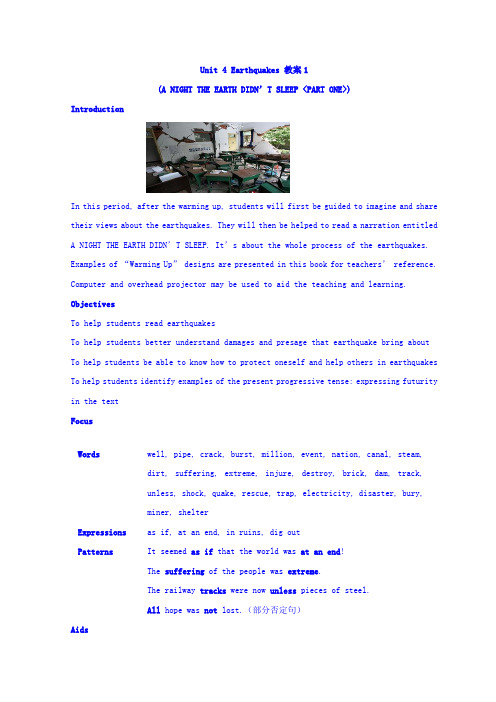
Unit 4 Earthquakes 教案1(A NIGHT THE EARTH DIDN ’T SLEEP <PART ONE>)IntroductionIn this period, after the warming up, students will first be guided to imagine and share their views about the earthquakes. They will then be helped to read a narration entitledA NIGHT THE EARTH DIDN ’T SLEEP . It’s about the whole process of the earthquakes. Examples of “Warming Up” designs are presented in this book for teachers’ reference. Computer and overhead projector may be used to aid the teaching and learning. ObjectivesTo help students read earthquakesTo help students better understand damages and presage that earthquake bring about To help students be able to know how to protect oneself and help others in earthquakes To help students identify examples of the present progressive tense: expressing futurity in the textFocusAidsWords well, pipe, crack, burst, million, event, nation, canal, steam,dirt, suffering, extreme, injure, destroy, brick, dam, track,unless, shock, quake, rescue, trap, electricity, disaster, bury,miner, shelterExpressionsas if, at an end, in ruins, dig out Patterns It seemed as if that the world was at an end !The suffering of the people was extreme .The railway tracks were now unless pieces of steel.All hope was not lost.(部分否定句)Multimedia facilities, tape-recorder, photos, diagrams, the blackboardProceduresI. Warming up(1) Warming up by talkingGood morning, class. I think you must know Mr. Nature, and he is emotional. When he is happy, we will have a fine weather, so can you describe these views? But he is emotional, when he gets angry, what will happen? Do you know how many kinds of natural disasters? What are they? Look at the pictures, can you name all the disasters?Have you ever experienced an earthquake? Can you describe how terrible an earthquake is?(The earth is shaking; all the buildings will fall down; many people will die; many children will become orphans.)(2) Warming up by discussingNow, look at the pictures of Tangshan and San Francisco in warming up and describe what you see in the pictures. (beautiful cities; broad roads; tall building; large population.)What will happen if there has been a big earthquake in these two cities?As we all know, earthquakes are disasters to everyone. But can we avoid or at least reduce the loss caused by earthquakes? Can we foretell earthquakes? Now let’s come to Pre-reading and decide what may happen before an earthquake comes.II. Pre-reading by talking and sharing(1) Enjoy a part of film of earthquakeA) What other disasters does it have? (flood/drought/earthquake/fire/typhoon/disease and so on)B) Which disaster may cause the worst damage? (earthquake)(2) Ask some questionsA) Have you ever heard a story of an earthquake? (show video of Tangshan and San Francisco earthquake)B) Have you experienced an earthquake? If you have, tell me your experience. If no, just imagine what will happen before an earthquake?C) The earthquake is coming, if you’re trapped in the earthquake, how will you feel? What will you do? Will you leave right away? If you have time to take only one thing, what will you take, why?D) What kind of damage can an earthquake cause? (buildings are destroyed; people are killed; families are broken…)III. Reading aloud to the recordingToday, we’ll learn a text about A NIGHT THE EARTH DIDN’T SLEEEP. Please listen and read aloud about the recording of the text A NIGHT THE EARTH DIDN’T SLEEEP on page 26. Pay attention to the pronunciation of each word and the pauses within each sentence.I will play the tape twice and you shall read aloud twice, too.IV. Reading and answeringFirst, let’s look at the title again, why the earth didn’t sleep for a night? What happened? What does the passage mainly talk about?Exchange your understanding of the passage with group members and work together to find the main idea of each part.Main idea of each part:Part 1 (para.1): Strange things were happening before the earthquake.Part 2 (para.2-3): The disaster happened and caused a lot of loss.Part 3 (para.4): All hope was not lost.V. Reading aloud once again and understanding(1) Read carefully and try to get more information to fill in the blanksPart 1:(2) Individual workPart 2:A) Get the students to find some details of this part.Details:a) At 3:42 am, the greatest earthquake of the 20th century began.b) Steam burst from holes in the ground.c) Hard hills of the rock became rivers of dirt.d) Bricks covered the ground like red autumn leaves.e) Two dams and most of the bridges fell.f) The railway tracks were now useless pieces of steel.g) Sand now filled the wells instead of water.h) Water, food, and electricity were hard to get.B) Fill in the blanks with the dataa) 1/3 of the nation felt the earthquake.b) A huge crack that was 8 kilometers long and 30 meters wide cut across houses.c) In 15 terrible seconds a large city lay in ruins.d) 2/3 of the people died or were injured during the earthquake.e ) The number of people who were killed or injured reached more than 400,000.f) All of the city’s hospitals, 75% of its factories and buildings and 90% of its homes were gone.VI. Reading and summing upSeveral days before July 28, 1976, many strange things happened in Tangshan. They were signs for the earthquake. At 3:42 am that day, the earth began to shake, which destroyed the city. Later that afternoon, another big earthquake struck Tangshan. More people were killed or injured and more buildings fell down. Soldiers were called in to help the rescue workers. Teams were organized to dig out the trapped and bury the dead.VII. Discussing in groups(1)How were the people helped by the army?A) The army organized teams to dig out those who were trapped and to bury the dead.B) Miners were rescued from the coal mines.C) Shelters were built for survivors whose homes had been destroyed.D) Fresh water was taken to the city.Let the groups have a discussion with their partners about more ways to help the people in the earthquake.(2) What shall we do or not do if an earthquake happens?DosA) Stay in a small room, such as kitchen or bathroom.B) Hide under the table or bed, if you haven’t time to escape, you may stand close to the inside wall with some things covering on the head.C) If you stay in the open air, keep off the tall building, and go to the fields without trees.Don’tsA) Be close to the outside wallB) Stay on the balconyC) Jump out of the tall buildingsD) Use the liftVIII. Closing down by taking a quizTrue or False(1) There were one million people in Tangshan at that time. T(2) The earthquake began 10 kilometers directly below the city. F(3) Not only the people but also the animals were shocked greatly. T(4) There was only one quake at that time. F(5) Before the earthquake there wasn’t anything strange happening. F(6) Workers rescued most of the 10,000 coal miners to the south of the city. F(7) Almost everything in Tangshan was destroyed. TIX. Homework(1) Surf the internet to find more information about earthquakes.(2) Finish the Comprehending part on page 27.精美句子1、善思则能“从无字句处读书”。
人教版高中英语必修1《Unit 4 Earthquakes》教案
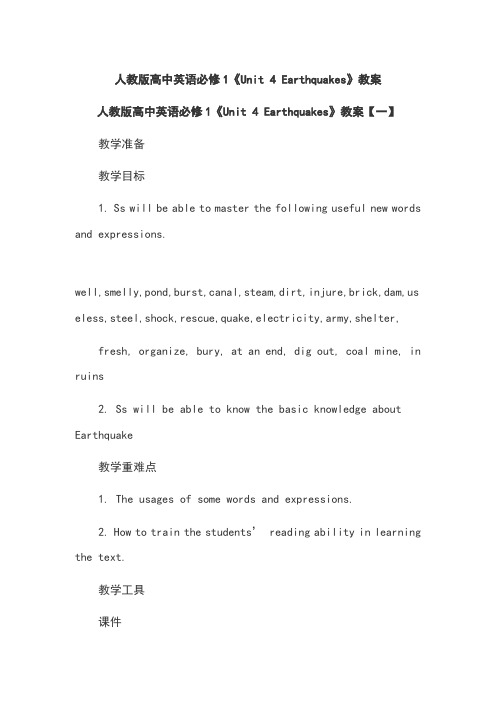
人教版高中英语必修1《Unit 4 Earthquakes》教案人教版高中英语必修1《Unit 4 Earthquakes》教案【一】教学准备教学目标1. Ss will be able to master the following useful new words and expressions.well,smelly,pond,burst,canal,steam,dirt,injure,brick,dam,us eless,steel,shock,rescue,quake,electricity,army,shelter, fresh, organize, bury, at an end, dig out, coal mine, in ruins2. Ss will be able to know the basic knowledge about Earthquake教学重难点1. The usages of some words and expressions.2. How to train the students’ reading ability in learning the text.教学工具课件教学过程Step I lead-inLet students see a short video and answer the questions1.What happened in the video? Earthquakes2.How do you feel seeing the plots(情节)? Students’discussion.Step II Fast reading1. What is the passage mainly about? InTangshan ,earthquakes happened on July 28th 19762. Skim the text and answer the questionsThe type of writing (写作体裁)Narrative writingTopic sentence of Paragraph 1Sentence 1Topic sentence of Paragraph 2Sentence 2Topic sentence of Paragraph 3Sentence 1Topic sentence of Paragraph 4Sentence 1Step III Detailed readingAsk students to read the text carefully and answer the questionsTask1: What were the nature signs of the coming earthquake?(选择)Para 11.Water in well( G )2. Well walls(D )3.Chickens &pigs(F )4 .Mice (A) 5.Fish(E ) 6. Bright lights( B) 7. Water pipes(C )A. Ran out of fieldsB. in the skyC. Cracked and burstD. Deep cracksE. Jumped out of pondsF. Too nervous to eatG. Rose and fell, fell and roseTask 2 Fill in the blanksMain IdeaDetailsDamage caused byearthquakePara 2-3At _____ am, the __________ earthquake of the 20th century began ._______ burst from holes in the ground.Hard hills of the rock became rivers of ____.________ covered the ground like red autumn leaves.Two _______ and most of the bridges fell.The railway tracks were now _________pieces of _______.______ now filled the wells instead of water.Water,food,and ______________ were hard to get.The reconstruction(重建) after the earthquakePara 41. The army _____________2. Workers ____________for survivors.3._____________was taken to the city.Details:1. At 3:42 am, the greatest earthquake of the 20th century began.2. Steam burst from holes in the ground.3. Hard hills of the rock became rivers of dirt.4. Bricks covered the ground like red autumn leaves.5. Two dams and most of the bridges fell.6. The railway tracks were now useless pieces of steel.7. Sand now filled the wells instead of water.8. Water, food, and electricity were hard to get.Step IV consolidation (当堂巩固)Let students fill the blanks according to the passageStrange things were happening in the countryside of northeast Hebei. For three days the water in the village wells kept rising and 1_________(fall). Farmers noticed that the well walls had deep cracks 2___________ them. A smelly gas came out of the cracks. In 3_________farmyards, the chickens and even the pigs were too nervous 4__________(eat). 5_________(mouse) ran out of the fields looking for places 6________(hide). Fish jumped outOf their bowls and ponds. At about 3 am on July 28,1976, some people saw bright lights 7_________ the sky. The sound of planes could 8________(hear) outside the city of Tangshan even 9_________ no planes were in the sky.In the city, the water pipes in some buildings cracked and burst. But the one million people of the city, ________thought little of these events, were asleep as usual that night.1 falling2 in3 the4 to eat5 mice6 to hide 7in 8 be heard 9when 10 who这部分目的是让学生进一步巩固课文的内容。
高中英语人教新课标必修一Unit4 Earthquakes Reading 教案
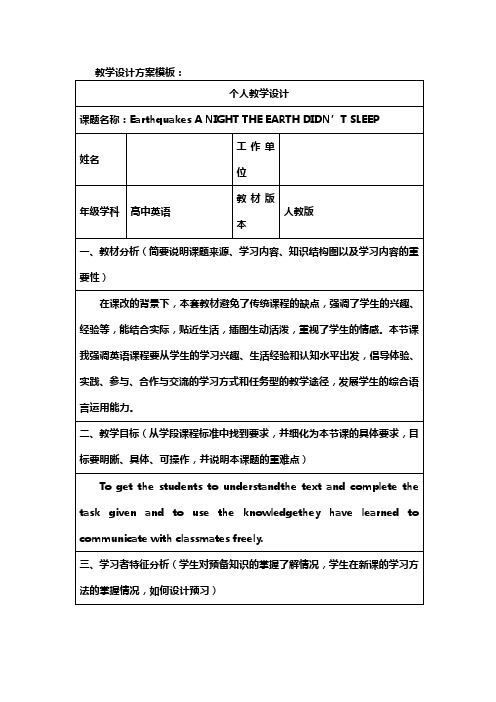
I let the students to think how to write this article themselves if the topic was given to them and this greatly cultivate the students’ divergent thinking.
四、教学策略设计(针对学习流程,设计教与学的方式)
1). To get the students to know basic knowledge about natural disasters
2). To get the students to learn about TangShan Earthquake
三、学习者特征分析(学生对预备知识的掌握了解情况,学生在新课的学习方法的掌握情况,如何设计预习)
素质教育的本质是要培养能够独立学习、自我创新的能力型人才,而新的人教版教材特别注意教材在这方面的设计。我们应该努力朝向让学生成人、成才、成功的方向上引导学生循着科学家的足迹,感受科学探究的一般程序,并从中领悟到科学方法和科学家之所以成功所必须具备的能力。
included—— I deleted the second question in Pre-reading and added a question
New words or phrases
be of pressure from inside
Atan end: finishednation: all the people in the country steam: gas that hot water gives out in ruins:
高中英语必修一人教版:Unit+4+Earthquakes+教学案1.doc
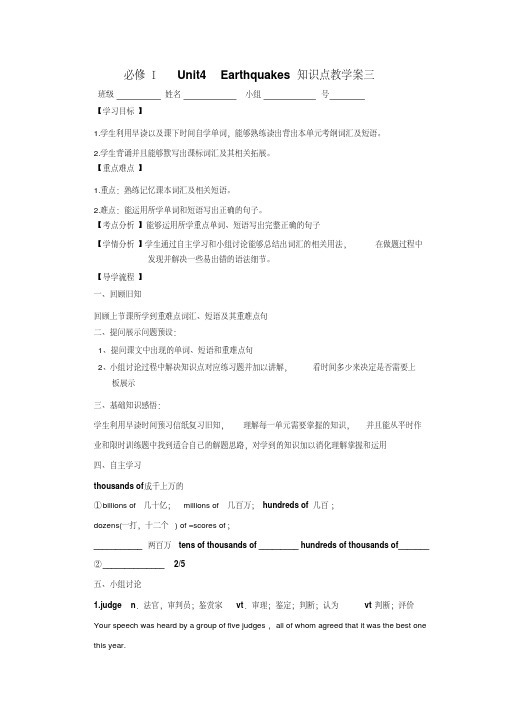
必修ⅠUnit4 Earthquakes知识点教学案三班级姓名小组号【学习目标】1.学生利用早读以及课下时间自学单词,能够熟练读出背出本单元考纲词汇及短语。
2.学生背诵并且能够默写出课标词汇及其相关拓展。
【重点难点】1.重点:熟练记忆课本词汇及相关短语。
2.难点:能运用所学单词和短语写出正确的句子。
【考点分析】能够运用所学重点单词、短语写出完整正确的句子【学情分析】学生通过自主学习和小组讨论能够总结出词汇的相关用法,在做题过程中发现并解决一些易出错的语法细节。
【导学流程】一、回顾旧知回顾上节课所学到重难点词汇、短语及其重难点句二、提问展示问题预设:1、提问课文中出现的单词、短语和重难点句2、小组讨论过程中解决知识点对应练习题并加以讲解,看时间多少来决定是否需要上板展示三、基础知识感悟:学生利用早读时间预习信纸复习旧知,理解每一单元需要掌握的知识,并且能从平时作业和限时训练题中找到适合自己的解题思路,对学到的知识加以消化理解掌握和运用四、自主学习thousands of成千上万的①billions of 几十亿;millions of 几百万;hundreds of 几百;dozens(一打,十二个) of =scores of;___________ 两百万tens of thousands of _________ hundreds of thousands of_______ ②______________ 2/5五、小组讨论1.judge n.法官,审判员;鉴赏家vt.审理;鉴定;判断;认为vt判断;评价Your speech was heard by a group of five judges,all of whom agreed that it was the best one this year.Judging by/from从...上看;根据...判断,置于句首作状语,v-ing形式不受主语的限制,构成独立成分。
高中英语新课标(人教版)教案必修一Unit4Earthquakes
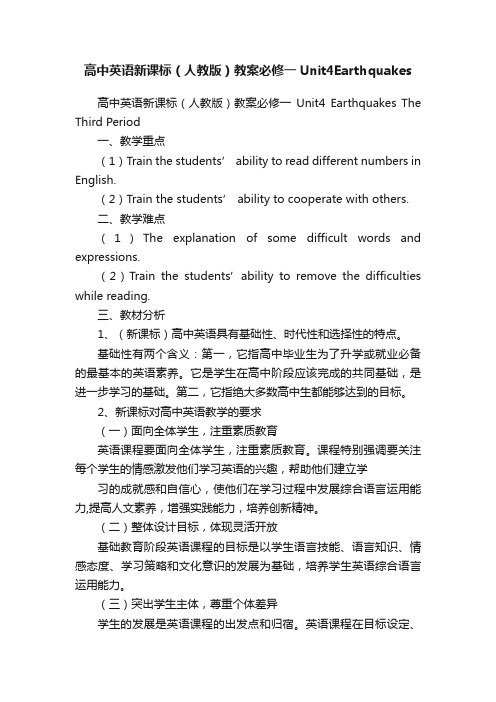
高中英语新课标(人教版)教案必修一Unit4Earthquakes高中英语新课标(人教版)教案必修一Unit4 Earthquakes The Third Period一、教学重点(1)Train the students’ ability to read different numbers in English.(2)Train the students’ ability to cooperate with others.二、教学难点(1)The explanation of some difficult words and expressions.(2)Train the students’ability to remove the difficulties while reading.三、教材分析1、(新课标)高中英语具有基础性、时代性和选择性的特点。
基础性有两个含义:第一,它指高中毕业生为了升学或就业必备的最基本的英语素养。
它是学生在高中阶段应该完成的共同基础,是进一步学习的基础。
第二,它指绝大多数高中生都能够达到的目标。
2、新课标对高中英语教学的要求(一)面向全体学生,注重素质教育英语课程要面向全体学生,注重素质教育。
课程特别强调要关注每个学生的情感激发他们学习英语的兴趣,帮助他们建立学习的成就感和自信心,使他们在学习过程中发展综合语言运用能力,提高人文素养,增强实践能力,培养创新精神。
(二)整体设计目标,体现灵活开放基础教育阶段英语课程的目标是以学生语言技能、语言知识、情感态度、学习策略和文化意识的发展为基础,培养学生英语综合语言运用能力。
(三)突出学生主体,尊重个体差异学生的发展是英语课程的出发点和归宿。
英语课程在目标设定、教学过程、课程评价和教学资源的开发等方面都突出以学生为主体的思想。
课程实施应成为学生在教师指导下构建知识、提高技能、磨砺意志、活跃思维、展现个性、发展心智和拓展视野的过程。
高中英语Unit 4 Earthquakes教案 新课标 人教版 必修1

高中英语Unit 4 Earthquakes教案新课标人教版必修1Part Two: Teaching Resources第二部分:教学资源Section1: A text structure analysis of A NIGHT THE EARTH DIDN’T SLEEPType of writing This is a piece of descriptive writingMain idea of the passage The article describes the cause, the course and theresult of Tang Shan earthquake in 1976. Itshows us the terrible image of earthquake. At thesame time it hits us that we must realize thatwe can do something to minimize the damagecaused by earthquake.Topic sentence of 1st paragraph Strange things were happening in the countryside innortheast Hebei.Topic sentence of 2nd paragraph Everything began to shake and it seemed that theworld was at an end.Topic sentence of 3rd paragraph Everywhere they looked nearly everything wasdestroyed.Topic sentence of 4th paragraph All hope was not lost.II. A text structure analysisTime/ order What happened Resultthree days before the earthquakeat about 3:00 am Saw: crackswater in the wells--- rose and fell,animals--- too nervous , hidefish jumped out of bowls & pondsbright light in the skywater pipes---cracked and burstheard: sound of planessmelt: smelly gas in the cracks of the wellsPeople thought little of theevents and went to bedas usualat 3:42 am felt: everything shookone-third nation felt itheard in Beijing 100 kilometers awaya huge crack cut across houses,roads…saw: steam burst from holes in the groundhard hills of rock-rivers of dirtcity lay in ruins4 400,000 peoplekilled/injured75% factories90% home were gonebricks covereddams/bridges fellnot safe railway tracksuselesscows never milkpigs/chickens diedwells filled with sandrescue workers and dotrapped under the ruinsbuildings fell downwater/food/electricityhard to getafter that hope not lostarmy sent 150,000 soldiersworkers built shelters for survivorsfresh water was taken to the citythe city began to breathe againOne possible versionStrange things happened in Tang Shan. For three days the water in the village wells rose and fell. The well walls had deep cracks and a smelly gas came out the cracks. The chickens, pigs and mice were too nervous. Fish jumped out of bowls and ponds. Bright light appeared in the sky. People heard the sound of planes even when no planes were in the sky. The water pipes in some buildings cracked and burst.At 3:42 am everything began to shake. It seemed that the world was at the end! One-third of the nation felt it. A huge crack cut across the city. In fifteen terrible seconds a large city lay in ruins. Two-thirds of the people died or were injured. Nearly everything was destroyed in the city. 75% of its factories and 90% of its homes were gone. Then later that afternoon, another big earthquake shook Tangshan. People began to wonder how long the disaster would last.But all hope was not lost. The army sent 150,000 soldiers to help them. Workers built shelters for survivors. Slowly, the city began to breathe again.。
人教新课标高中英语必修一Unit 4 Earthquakes导学案

高一英语必修1Unit4Earthquakes导学案第一课时阅读课(语篇分析)I. 教学准备教学目标:1. Get the students to know basic knowledge about natural disasters, especially the knowledge about earthquake through the understanding of the text.2. The long and difficult sentences in the text. The importance in this text is the attributive clause.For example: Then, later that afternoon, another big quake which was almost as strong as the first one shook Tangshan.通过分析,教会学生如何分析长难句。
2. 教学重点/难点1.培养学生如何抓主旨大意和段落大意的能力。
2.运用阅读策略培养学生的其他的阅读理解能力。
3.帮助学生学会分析长难句。
II. 教学过程Step1. 语篇导读Lead-in1.Do you believe doomsday, the end of the world? What will happen on the day?2.Introduce the disaster “Hurricane , Tsunami, Volcano eruption, Earthquake” Which disaster makes you frightened most?3.Discussion: How much do you know about an earthquake?Step 2. Skimming用一句话概括What does the passage mainly talk about?The passage mainly talks about a terrible________(回答what?) that happened in ________( where?) in _______( when? ) and caused great damage to people. (What result?)Step 3. Fast reading1. Read the passage quickly and try to match(匹配) each paragraph with its main idea. Pay attention to (注意) the first and second sentences of each paragraph.Para 1 The earthquake destroyed the city of Tangshan.Para 2 The army came to help the survivors, bringing hope for a new life. Para 3 Before the earthquake strange things began to happen, but no one paid attention to them.Para.4 The people were very shocked at the destruction.2. We can divide the four paragraphs into three parts, match it with its main ideaPart 1 (Para.1 ) damage during the earthquakePart 2 ( ) The rescue work after the earthquake Part 3 ( ) Signs before the earthquake.☆点拨:Structure of the whole passageStep 4 Details of each partPart 1 Before the earthquake*the water ________________________________________________ *the well walls _______________________________________________ *chickens & pigs _______________________________________________ *mice ________________________________________________ *the water pipes ________________________________________________ *people ________________________________________________ Part 2I.II..Data ( 数据)(1)_______ of the nation felt the earthquake.(2)A huge crack that was kilometres long and metres wide cut across houses.(3)In terrible seconds a large city lay in ruins.(4) of the people died or were injured during the earthquake.(5) The number of people who were killed or injured reached more than .(6)All of the city’s hospitals, of its factories and buildings and of its homes were gone.Part 3 What happened after the earthquake1)The sent 150,000 soldiers to Tangshan, and organized teams to dig out those who were trapped and to bury the dead.2)Workers built for survivors whose homes had been destroyed.3)Result: The city began to again.Step 4 Sentences1. 原句:“A huge crack that was eight kilometers long and thirty metres wide cut across houses, roads and canals.”分析:这是一个____________(简单句/ 并列句/主从复合句),该主句的主语为____________,谓语为_________, cut across在这里意为: “径直穿过”, 中间跟一个由that引导的________从句:“that was eight kilometers long and thirty metres wide”, that 在从句中充当______, 修饰的先行词为___________ .翻译:_____________________________________________________________。
高中英语 Unit4 Earthquakes学案 新人教版必修1 学案
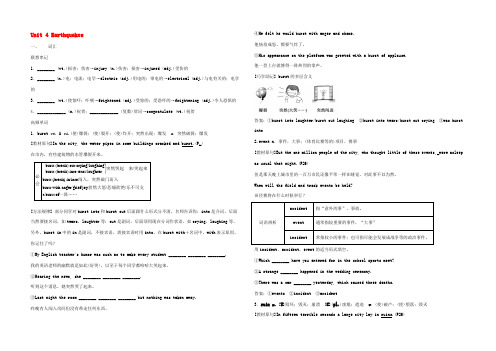
Unit 4 Earthquakes一、词汇联想串记1.________ (vt.)损害;伤害→injury (n.)伤害;损害→injured (adj.)受伤的2.________ (n.)电;电流;电学→electric (adj.)用电的;带电的→electrical (adj.)与电有关的;电学的3.________ (vt.)使惊吓;吓唬→frightened (adj.)受惊的;受恐吓的→frightening (adj.)令人恐惧的4._____________ (n.)祝贺;_____________ (复数)贺词→congratulate (vt.)祝贺高频单词1.burst vt. & vi.(使)爆裂;(使)裂开;(使)炸开;突然出现;爆发n.突然破裂;爆发[教材原句]In the city, the water pipes in some buildings cracked and burst.(P 26)在市内,有些建筑物的水管爆裂开来。
必会⎭⎪⎬⎪⎫burst (break) out crying/laughingburst (break) into tears/laughter突然哭起来/笑起来burst (break) in/into闯入,突然破门而入burst with anger/grief/joy勃然大怒/悲痛欲绝/乐不可支a burst of一阵……[方法规律] 部分同学对burst into和burst out后面跟什么形式分不清,名师告诉你:into是介词,后面当然要接名词,如tears,laughter等;out是副词,后面须用现在分词作状语,如crying,laughing等。
另外,burst in中的in是副词,不接宾语,需接宾语时用into。
在burst with+名词中,with表示原因。
你记住了吗?①My English teacher's humor was such as to make every student ________ ________ ________.我的英语老师的幽默就是如此(好笑),以至于每个同学都哈哈大笑起来。
人教版新课标必修一 Unit 4 Earthquakes学案
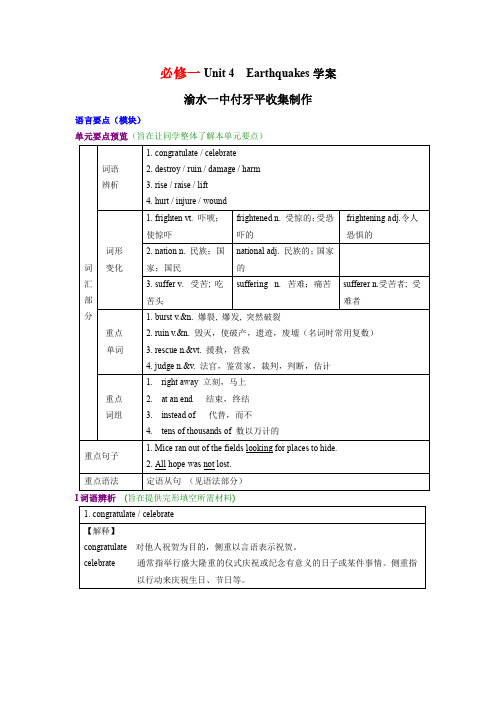
必修一Unit 4 Earthquakes学案渝水一中付牙平收集制作语言要点(模块)单元要点预览(旨在让同学整体了解本单元要点)I词语辨析(旨在提供完形填空所需材料)II词性变化(旨在提供语法填空所需材料)Ⅲ重点词汇(旨在提供综合运用所需材料)1. burst v.&n. 爆裂, 爆发, 突然破裂[典例]1).The red balloon suddenly burst. 那个红色的气球突然爆了。
2). The police burst through the door. 警察破门而入。
3). On hearing the news, Leslie burst into laughter while Tracy burst out crying.一听到这则消息,Leslie突然大笑,而Tracy则突然大哭起来。
4). A burst of hand-clapping followed the ending of the song.歌声结束后响起了一阵掌声。
[重点用法]burst into laughter = burst out laughing 突然大笑burst into tears = burst out crying 突然大哭[练习] 中译英1). 水管在寒冷的天气里经常冻裂。
__________________________________________________________________________________________2). 太阳突然从云端里露出来。
_______________________________________________________________________________ ___________答案: 1). Water-pipes often burst in cold weather.2). The sun burst through the clouds.2. rescue n.&vt. 援救,营救[典例]1). The police came to his rescue and pulled him out of the river.警察来救他,把他从河里拉了出来。
人教版高一英语必修1 Unit 4 Earthquakes学案含答案
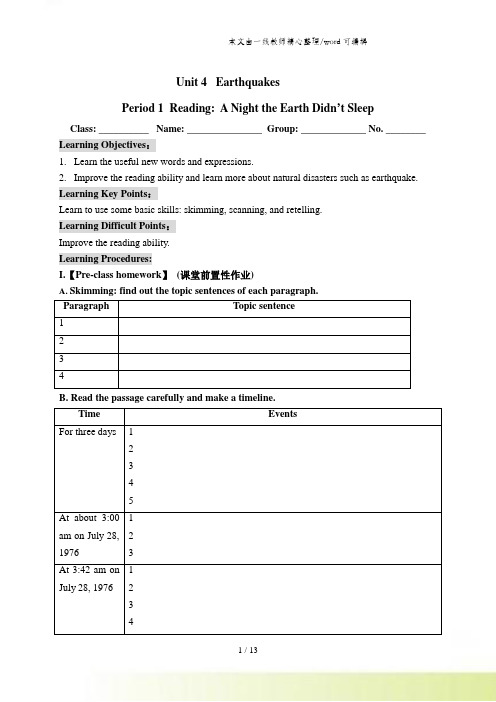
Unit 4 EarthquakesPeriod 1 Reading: A Night the Earth Didn’t Sleep Class: __________ Name: _______________ Group: _____________ No. ________ Learning Objectives:1.Learn the useful new words and expressions.2.Improve the reading ability and learn more about natural disasters such as earthquake. Learning Key Points:Learn to use some basic skills: skimming, scanning, and retelling.Learning Difficult Points:Improve the reading ability.Learning Procedures:I.【Pre-class homework】 (课堂前置性作业)A. Skimming: find out the topic sentences of each paragraph.Paragraph Topic sentence1234B. Read the passage carefully and make a timeline.Time EventsFor three days 12345At about 3:00 am on July 28, 1976 1 2 3At 3:42 am on July 28, 1976 1 2 3 45 6Afternoon of July 28, 1976 1 2Soon after the quake 1 2 3II. 【While-class】Step 1 Lead-inStep 2 Group discussionSs discuss their pre-class homework in groups.Step 3 Consolidation:ScanningAnswer the following questions according to the text.1. Why were people asleep as usual that night before the earthquake?2. During the earthquake, what damage was caused?3. Why did the writer use so many numbers?4. After the earthquake, what rescue work was performed?Step 4 PresentationChoose a paragraph and act out an interview between a reporter and a survivor from the Tangshan earthquake.EXAMPLE:Paragraph 1Reporter: Did you notice anything strange before the earthquake?Survivor: There were some strange things…Reporter: …Survivor: …Step 5 HomeworkIII.【Post-class】Self- reflectionI enjoyed learning about:I found these words useful:I found these expressions useful:I. 【Pre-class homework】A.1. Strange things were happening in the countryside of northeast Hebei.2. It seemed as if the world was at an end!3. Everywhere they looked nearly everything was destroyed.4. All hope was not lost.B. Read the passage carefully and make a timeline.Time EventsFor three days 1 water in the village wells rose and fell2 well walls had deep cracks and a smell gas came out of the cracks3 chickens and pigs were too nervous to eat4 mice ran out of the fields5 fish jumped out of their bowls and pondsAt about 3:00 am on July 28, 1976 1 bright lights appeared in the sky2 the sound of planes could be heard although there were no planes3 some water pipes cracked and burstAt 3:42 am on July 28, 1976 1 a huge crack cut across houses, roads and canals2 steam burst from holes in the ground3 rock became rivers of dirt4 more than 400,000 people were killed or injured5 75% of the factories and buildings and 90% of homes were gone6 cows would never give milk again, pigs and chickens were deadAfternoon of July 28, 1976 1 another big quake which was as strong as the first one shook.2 more damage was done to rescuers and buildingsSoon after the quake 1 the army was sent to help2 shelters were built for survivors3 fresh water was brought inStep 3 Consolidation:Scanning A.1. Because they thought little of / ignored the strange things happening before the earthquake.2. ①The city lay in ruins. Houses, roads, canals,buildings, dams, bridges, and railwaytracks were destroyed.② People were killed, injured or trapped.③ Animals suffered greatly.3. Show the facts that the earthquake wasgreat and that the suffering of the people was extreme.4. ①The army dug out the trapped andburied the dead.②The workers built shelters for thehomeless survivors.Step 4 PresentationParagraph 1Reporter: Did you notice anything strange before the earthquake?Survivor: There were some strange things. I didn’t see all of them.Reporter: What did you see?Survivor: I saw some cracks in pipes on some buildings but I didn’t worry too much about them.Reporter: Did you hear of other things?Survivor: Yes, some people saw cracks in the wells and a smelly gas coming out of them.Some of the animals behaved strangely too.Reporter: Thank you. You have been very helpful.Period 2 Language focus in Reading 1Class: __________ Name: _______________ Group: _____________ No. ________ Learning Objectives:1. Learn the important useful sentences and patterns.2. Make sentences by using the useful expressions.Learning Key points:Enable Ss to grasp the usages of such important new words and patterns.Learning Difficult Points:Get Ss to understand some difficult and long sentences.Learning Procedures:I. 【Pre-class homework 】 (课堂前置性作业) Make sentences using the following works and phrases:1. burst 2. at an end 3. ruin 4. injure 5.shock6. a number ofII. 【While-class 】Step 1 Lead-inStep 2 Group discussionSs discuss their pre-class homework in groups. Step 3 Consolidation1. In the farmyards, the chickens and even the pigs were too nervous to eat. 汉译英:(1)安妮太害怕了,不敢在户外体验大自然。
人教必修一Unit 4 Earthquakes同步学案4
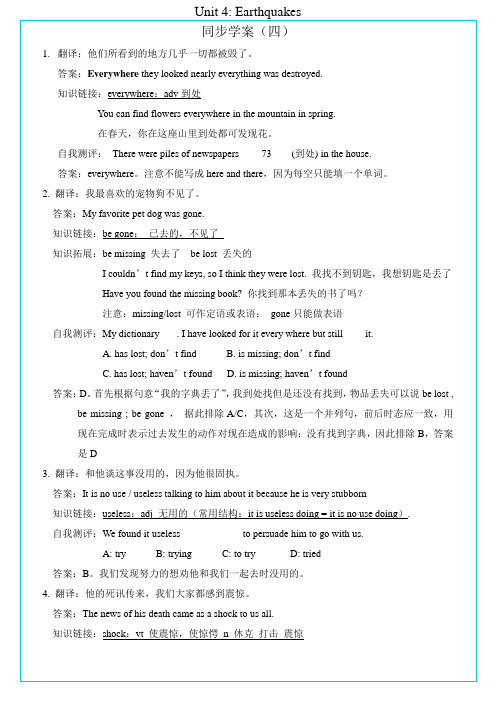
注意:missing/lost 可作定语或表语; gone只能做表语
自我测评:My dictionary ___. I have looked for it every where but still ____it.
He had not yet recovered from the shock. 他还没有从打击中恢复过来。
The news was shocking.这个消息令人震惊。
I was shocked at the news我对这个消息感觉很震惊。
The news shocked me.这个消息令我惊呆了。
自我测评:We found it useless____________to persuade himto go with us.
A:tryB:tryingC:to tryD:tried
答案:B。我们发现努力的想劝他和我们一起去时没用的。
4.翻译:他的死讯传来,我们大家都感到震惊。_____________________________________
注意:shock用作名词时指“情绪上的打击”不可数,指“给人打击的事情”可数
知识拓展:shocking: adj 令人震惊的;shocked:adj 感觉惊讶的
类似的表示惊讶的词语:surprise、astonish(惊讶程度shock最大,surprise最弱)
自我测评:The whole world was ____ when they heard that the earthquake had caused so manydeaths.(漳浦一中期中试题)
A. concerned B. shockedC. excited D. interested
- 1、下载文档前请自行甄别文档内容的完整性,平台不提供额外的编辑、内容补充、找答案等附加服务。
- 2、"仅部分预览"的文档,不可在线预览部分如存在完整性等问题,可反馈申请退款(可完整预览的文档不适用该条件!)。
- 3、如文档侵犯您的权益,请联系客服反馈,我们会尽快为您处理(人工客服工作时间:9:00-18:30)。
Unit 4 EarthquakesWarming Up1、Many people believe that “It is always calm before a storm.” Look carefully at the two photos. Now imagine there has been a big earthquake. Describe to your partner what might happen to the objects in the photos. Then have a class discussion.许多人认为:“风暴前总是风平浪静。
”仔细瞧下面两幅图,想象已经发生了地震。
向你的同伴描述图中的物体可能发生什么情况。
进行课堂讨论。
2、Imagine your home begins to shake and you must leave it right away.设想你的房子开始晃动,你必须马上离开。
美国英语right away,相当于通用英语at once,用于口语。
Pre-reading & Reading课文学习A NIGHT THE EARTH DIDN’T SLEEP地球不眠之夜Strange things were happening in the countryside of northeast Hebei. For three days the water in the village wells rose and fell, rose and fell. Farmers noticed that the well walls had deep cracks in them. A smelly gas came out of the cracks. In the farmyards, the chickens and even the pigs were too nervous to eat. Mice ran out of the fields looking for places to hide. Fish jumped out of their bowls and ponds. At about 3:00 am on July 28, 1976, some people saw bright lights in the sky. The sound of planes could be heard outside the city of Tangshan even when no planes were in the sky. In the city, the water pipes in some buildings cracked and burst. But the one million people of the city, who thought little of these events, were asleep as usual that night.河北省东北部的农村在发生奇怪的事情。
三天来村里水井的水涨落,涨落。
农民注意到井壁有深深的裂缝。
一股臭气从裂缝里泄漏出来。
院落里,鸡,甚至猪紧张得不进食。
老鼠从田里跑出来寻找隐藏的地方。
鱼从鱼缸和池塘里跳出来。
1976年7月28日凌晨3时,有些人看到天空中明亮的灯光。
即使天空中没有飞机可以听到唐山市外面有飞机的声音。
在城市里,一些建筑物的水管破裂、爆裂。
但是这个一百万人口的城市,很少有人想到这些事件,那天晚上跟往常一样睡着了。
At 3:42 am everything began to shake. It seemed as if the world was at an end! Eleven kilometres directly below the city the greatest earthquake of the 20th century had begun. It was felt in Beijing, which is more than two hundred kilometres away. One-third of the nation felt it. A huge crack that was eight kilometres long and thirty metres wide cut across houses, roads and canals. Steam burst from holes in the ground. Hard hills of rock became rivers of dirt. In fifteen terrible seconds a large city lay in ruins. The suffering of the people was extreme. Two-thirds of them died or were injured during the earthquake. Thousands of families were killed and many children were left without parents. The number of people who were killed or injured reached more than 400,000.3点42分是一切开始摇晃。
世界似乎到了末日!该市11公里以下,20世纪最大的地震开始了。
二百多公里外的北京有震感。
该国家三分之一的地方有震感。
一条巨大的长8公里宽三十米的裂缝穿透房屋、道路和运河。
蒸汽从地洞里突然喷薄而出。
坚硬的山岩变成滚滚浊流。
十五秒可怕的时间里一个大城市沦为废墟。
人们的痛苦到了极端。
地震中三分之二的人在或者死亡或受伤。
成千上万个家庭遇难,许多孩子失去了父母。
丧生或受伤的人数达到了40多万人。
But how could the survivors believe it was natural? Everywhere they looked nearly everything was destroyed. All of the city's hospitals, 75% of its factories and buildings and 90% of its homes were gone. Bricks covered the ground like red autumn leaves. No wind, however, could blow them away. Two dams fell and most of the bridges also fell or were not safe for travelling. The railway tracks were now useless pieces of steel. Tens of thousands of cows would never give milk again. Half a million pigs and millions of chickens were dead. Sand now filled the wells instead of water. People were shocked. Then, later that afternoon, another big quake which was almost as strong as the first one shook Tangshan. Some of the rescue workers and doctors were trapped under the ruins. More buildings fell down. Water, food, and electricity were hard to get. People began to wonder how long the disaster would last.但幸存者怎么可能相信这是自然现象呢?他们看到的地方几乎一切都被摧毁了。
所有的城市的医院、75%的工厂和建筑和90%的家庭都消失了。
砖块像秋天的红叶盖满地面。
然而,没有风可以吹走它们。
两座水坝倒塌了,大部分的桥梁也降塌了,或不能安全行走了。
铁轨成了无用的钢块。
成千上万的牛不能再产奶了。
五十万头猪和数以百万计的鸡都死了。
井里现在充满了沙,没有水了。
所有人都大为震惊。
那天下午晚些时候,又一波大地震,几乎和第一波一样强烈的地震震动唐山。
一些救援人员和医生被困在废墟下。
更多的楼房倒了。
水、食物和电都很难得到。
人们开始怀疑这场灾难还会持续多久。
All hope was not lost. Soon after the quakes the army sent 150,000 soldiers to Tangshan to help the rescue workers. Hundreds of thousands of people were helped. The army organized teams to dig out those who were trapped and to bury the dead. To the north of the city, most of the 10, 000 miners were rescued from the coal mines there. Workers built shelters for survivors whose homes had been destroyed. Fresh water was taken to the city by train, truck and plane. Slowly, the city began to breathe again.不是所有的希望都破灭了。
地震后不久军队派遣150000名士兵到唐山帮助救援人员。
成千上万的人得到帮助。
军队组成团队挖出被困的人,并埋葬死者。
城市的北部,一万名矿工的大多数从煤矿中获救。
工人们为家园被毁的幸存者建造庇护所。
火车、卡车和飞机把淡水带到这座城市。
慢慢地,这座城市又开始有生气了。
1、For three days the water in the village wells rose and fell, rose and fell.三天来,村子里的井水上升、下降,上升、下降。
